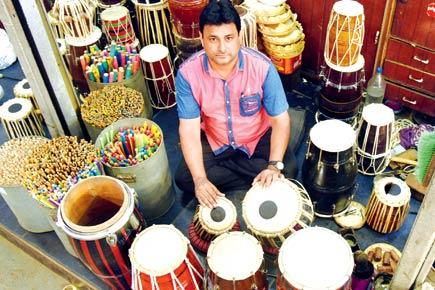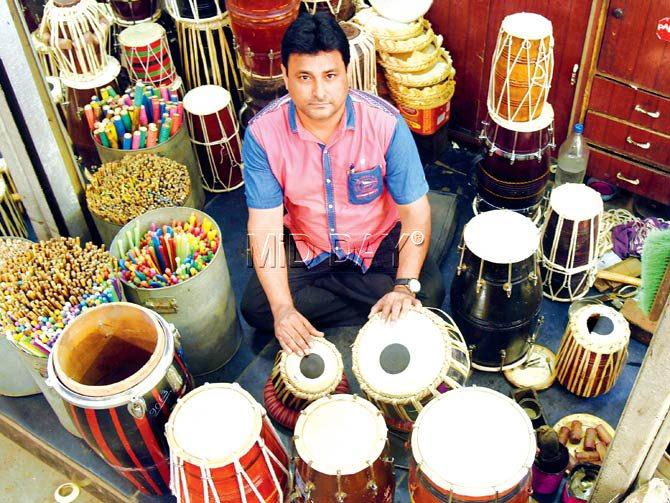Kamlesh Chauhan, whose Indian musical instruments store at Malad has catered to the likes of SD Burman and Laxmikant-Pyarelal, talks of why there's still a market for his goods


Kamlesh Chauhan at his Malad store where he manufactures and repairs Indian musical instruments. Pic/Nimesh Dave
ADVERTISEMENT
Each time Kamlesh Chauhan hears the Mohammed Rafi number, Yeh Duniya, Yeh Mehfil from the 1970 hit Heer Ranjha, he breaks into a smile despite the melancholic lyrics. The song's composer Madan Mohan, he recalls, purchased the khol — a terracotta two-sided drum which is used in the song — from his shop, Ganesh Vadhyalaya. This, however, is only one of the many celebrity moments in the history of this store for hand-made Indian musical instruments.
Located near New Municipal Market, Malad (West), Ganesh Vadhyalaya, has, in its almost 50 years of existence, seen both professionals and amateurs making a beeline for its indigenous products. Some to purchase custom-made instruments, while others to get their instruments repaired. The glass cabinets and the granite flooring are packed with tablas, mridangams, dumroos, pakhawajs and dholaks. Its modest interiros have remained almost the same since 1968.
"Since we produce on a smaller scale, the store isn't as fancy as some others in the city. We have two workers who make the instruments here," he says. The shop, presently, has about 35 to 40 Indian musical instruments. "Right from the start, we have manufactured only those instruments that involve wood and leather. String instruments have never been on our radar as they require a different technique and apparatus, which we never invested in," he tells us.

(Centre) Kamlesh Chauhan with Laxmikant-Pyarelal
Our conversation with Chauhan is peppered with anecdotes about instruments that played a key role in some very popular songs. "Do you remember the song, Chappa Chappa Charkha Chale from Maachis? The dhol played by Ramjubhai Langa, a renowned dhol player, was manufactured here. He would often drop by at our shop. All the dhols used by him for Daler Mehendi's songs were also from here," he says.
Chauhan says his publicity has always been through word of mouth. "When music directors hear a particular instrument sounding well during recording, they get curious. This is how most celebrity musicians have used my instruments," he says, adding that most don't personally drop by but send their musicians to do the needful.
For the legendary music composer, Pandit Sudarshan Adhikari, a renowned musician who would play for them, would often drop by. "The percussion used in the song Hothon Pe Aisi Baat [Jewel Thief] was played Anna Joshi, who used to work for SD Burman," he adds. Another point of contact in the entertainment industry for Chauhan has been his guru, Pandit Bhavanishankar who plays the tabla and pakhawaj for maestros like Ustad Zakir Hussain.
Although the shop was set up in 1968, it has a fragmented history. "My father, Kantilal, used to run the shop with his brother at Lalbaug long before he set this up. However, they separated, and my father established Ganesh Vadhyalaya," says the tabla player.
Despite parting ways, business was fairly impressive for the Chauhans. All was good until 1970 when Chauhan's father passed away due to a massive stroke, and life came crashing down for the family. "My two siblings and I were very young and there was nobody to support my mother. So, she had two options, either sell the shop and go back to Gujarat or take charge of the shop and learn the ropes." She picked the latter. With two workers to assist, Madhuben gave up her job as a school teacher and dived headlong into running the business. "Although she can't play any instrument, she certainly knows how all are made," he laughs.
Despite catering to the who's who, Chauhan admits that receiving recognition for work done is rare. "Naturally, all credit goes to the music composer. Rarely does somebody acknowledge the maker of the instrument," he says.
With the onslaught of technology reducing the demand for musicians, Chauhan, admits business is not as it used to be earlier. "Earlier, while 10 dhol players were needed for a song, now they use one and use technology that makes it sound like there are 10 people playing the same." What's worsened the situation is the easy accessibility of musical instruments on the Internet. "People might purchase an instrument online, but when they hear the sound, it's not the same. That's when they come back to me," he smiles.
 Subscribe today by clicking the link and stay updated with the latest news!" Click here!
Subscribe today by clicking the link and stay updated with the latest news!" Click here!






